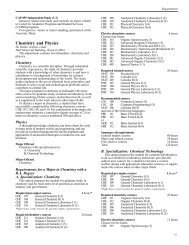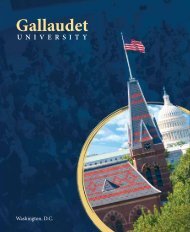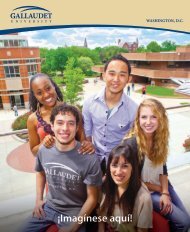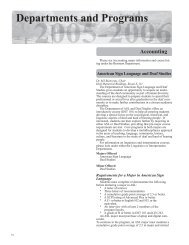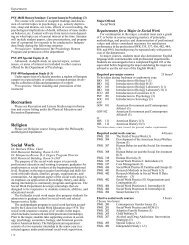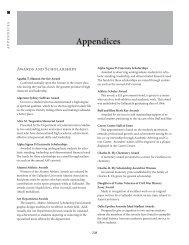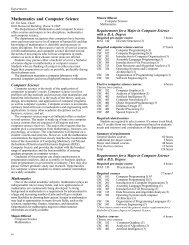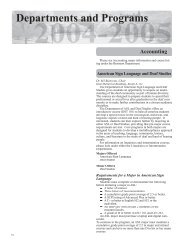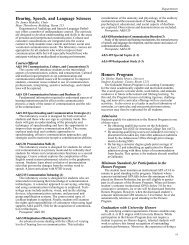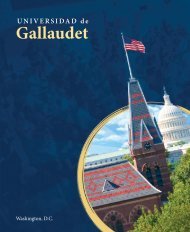catalog 05-06.indd - Undergraduate Admissions - Gallaudet University
catalog 05-06.indd - Undergraduate Admissions - Gallaudet University
catalog 05-06.indd - Undergraduate Admissions - Gallaudet University
You also want an ePaper? Increase the reach of your titles
YUMPU automatically turns print PDFs into web optimized ePapers that Google loves.
About <strong>Gallaudet</strong>are usually granted and conferred in Colleges.” PresidentAbraham Lincoln signed the bill and became the first patronof the National Deaf Mute College. Edward Miner <strong>Gallaudet</strong>became president of both the Institution and the College. In1865 blind students attending the Columbia Institution weretransferred to the Maryland School for the Blind, and thewords “and the Blind” were dropped from the Institution’stitle.The first class to take the entire college course graduatedin 1869. The diplomas of three graduates were signed byPresident Ulysses S. Grant. Since that time, all <strong>Gallaudet</strong>diplomas have been signed by the President of the UnitedStates. Women were first admitted to the college in 1887. In1891 a graduate department was started to prepare hearinggraduates of other colleges to become teachers of deafchildren. At the request of the alumni, in 1894 the Board ofDirectors renamed the college <strong>Gallaudet</strong> College in honorof Thomas Hopkins <strong>Gallaudet</strong>. The corporation (includingKendall School) continued to be known as the ColumbiaInstitution until 1954, when Public Law 420 of the 83rd Congresschanged the name of the entire institution to <strong>Gallaudet</strong>College. Public Law 420 also stated Congress’ intent to continueadequate financial support of <strong>Gallaudet</strong> and affirmedthe importance of higher education for deaf people. In 1957<strong>Gallaudet</strong> was granted accreditation by the Middle States Associationof Colleges and Schools, and has been re-accreditedevery ten years since then. Over the years, the campus andits facilities have grown to meet the needs of its students, andits programs have evolved to serve deaf and hard of hearingindividuals nationally and internationally.In 1969, the Model Secondary School for the Deaf was establishedon Kendall Green to develop and evaluate innovativecurriculum and instructional strategies for deaf and hardof hearing high school students. In 1970, Congress passedthe Kendall Demonstration Elementary School Act (P.L. 91-587), which transformed the historic Kendall School into ademonstration elementary school with programs for studentsfrom birth through eighth grade expanding its role to includeresearch and dissemination. The Laurent Clerc National DeafEducation Center (“Clerc Center”), formerly called Pre-College National Mission Programs, encompasses KDES,MSSD, and other units devoted to the research, development,and dissemination functions mandated. For more informationabout the Clerc Center, visit their website: http://clerccenter.gallaudet.edu/.Congress acted during the 1985-86 academic year torecognize the growth and development that has been an integralpart of <strong>Gallaudet</strong>’s history. On August 4, 1986, PresidentRonald Reagan signed into law the Education of the Deaf Actof 1986, which bestowed university status upon <strong>Gallaudet</strong>.On March 6, 1988, <strong>Gallaudet</strong> students began a demonstration,now known as the Deaf President Now movement, toprotest the hiring of a hearing president of the <strong>University</strong>.What began as a student protest grew into a civil rightsmovement for deaf people. Within less than a week, the hearingpresident, Dr.. Elisabeth Ann Zinser, resigned her post,and Dr.. I. King Jordan was selected by the Board of Trusteesas the <strong>University</strong>’s first deaf president. Philip Bravin becamethe first deaf chair of the Board of Trustees, and in February1991, <strong>Gallaudet</strong>’s Board of Trustees reached the goal set duringthe Deaf President Now movement of having a majorityof deaf members.President Jordan continues to be an important spokesmanin the struggle to gain equal rights for people who are deafor have other disabilities, which culminated in the July 1990signing of the Americans with Disabilities Act (ADA). Thishistoric legislation bans discrimination against people withdisabilities in employment, public transportation, generalservices, accommodations, and telephone services.Accreditation<strong>Gallaudet</strong> <strong>University</strong> is fully accredited by the Commissionon Higher Education of the Middle States Associationof Colleges and Schools, and many of its programs alsohave full accreditation from professional accrediting bodies,including the: National Association of School Psychologists(NASP); National Council for Accreditation ofTeacher Education (NCATE); Council on Accreditation ofCounseling and Related Programs (CACREP); AmericanSpeech-Language Association (ASHA); Association of CollegiateBusiness Schools and Programs (ACBSP); NationalAssociation of State Directors of Teacher Education andCertification (NASDTEC); Council on Education of the Deaf(CED); American Psychological Association (APA); Councilon Social Work Education (CSWE); and Conference ofEducational Administrators of School Programs for the Deaf(CEASED).<strong>Gallaudet</strong>’s Mission<strong>Gallaudet</strong>’s programs and the activities of its faculty andstaff are guided by its formal statements of mission, vision,sign communication, diversity and its Credo.The Mission StatementThe mission of <strong>Gallaudet</strong> <strong>University</strong> is to serve as acomprehensive, multi-purpose institution of higher educationfor deaf and hard of hearing citizens of the United States andof the world. In addition to its undergraduate and graduateacademic programs, the <strong>University</strong> also offers national demonstrationelementary and secondary education programs.The <strong>University</strong> extends its activities to a worldwide audiencethrough a network of regional centers, international agreements,and public service and advocacy efforts.<strong>Gallaudet</strong> <strong>University</strong> is the only liberal arts university inthe world designed exclusively for deaf and hard of hearingstudents. Communication among faculty, staff, and students,whether in or out of the classroom, is through the use of bothsign language and written and spoken English. As a result,students are able to participate fully in all aspects of campuslife and thereby acquire the comprehensive education andexperience that is the goal of a liberal arts education.<strong>Gallaudet</strong> <strong>University</strong> is committed to providing instructionin the arts and sciences that is vital to the development of theintellect; to conducting research aimed at enhancing the livesof deaf and hard of hearing individuals; and to serving deafand hard of hearing people, their families, friends, and theprofessionals who work with them.The Vision StatementThe vibrant <strong>Gallaudet</strong> <strong>University</strong> of today is a tribute toour enduring heritage as an academic institution and culturalcenter. We are proud of our contributions to the success ofgenerations of deaf and hard of hearing leaders who haveserved our nation and international community well. Today,as powerful new forces generate encompassing change in societyagainst a backdrop of an increasingly diverse Americaand an increasingly interconnected world, we must redefinewhat is the best education for deaf and hard of hearing students.We must chart bold new directions to guide our actionsas we move toward the 21st century and beyond.<strong>Gallaudet</strong> students will experience those intellectual andpractical challenges that lead to productive work, communityservice, and personal satisfaction.The heart and soul of <strong>Gallaudet</strong> has been and must continueto be quality undergraduate education. We will challengeour students to work up to their abilities and challengeour faculty to teach innovatively as they demand exemplary2



